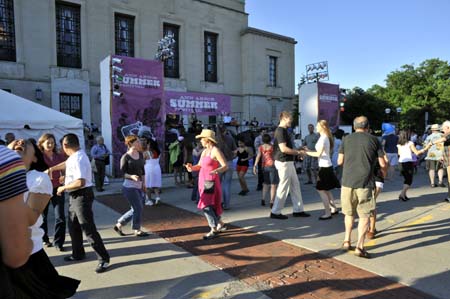Dancing to summer music outdoors and for the Japanese American Obon festival

Dancing to the tunes of Los Gatos at Ann Arbor Summer Festival Top of the Park | Photograph courtesy Peter Smith www.petersmithphoto.com
My daughter Hao Hao and I were at an outdoor music festival when she first spied the little girl. About 3 years old, in a pink Hello Kitty dress, and one long brown curly ponytail, the little girl was dancing and twirling and hopping and flopping along with the music in front of the stage. “Awww, so cute.”
“That was you, not too long ago.”
(Then the little girl tried to climb onto the stage for her adoring fans, “That was definitely you.”)
I love listening to music at big outdoor summer events like Madcat Ruth at Ann Arbor Summer Festival's Top of the Park or George Bedard and the Kingpins at Grillin’ for Food Gatherers.
There is always an older couple dancing close on the side, cute little kids in sandals hopping all around. Perhaps the Internet has ruined my ability to concentrate for long periods of time, but I like the openness, the casualness, the fresh breeze ruffling the leaves on the trees.
I was so pleased when my youngest child was finally old enough to go to concerts and plays at the University Musical Society so that we could all go out and see shows together.
Unfortunately, my oldest ones then became teenagers and started having their own opinions about whether or not they would attend. Add on trying to arrange to meet friends at Hill Auditorium, and that turned out to be just too much logistics for me.
So we avoid dressing up in fancy clothes and worrying about restless children getting shushed, and we listen to music outdoors all summer long and into the night; and when the music and mood are just right, we get up and we dance.
July is also Obon season.
The Obon festival is the Japanese festival of the dead, similar to the Christian All Soul’s Day and the Chinese Hungry Ghosts Festival (gui jie). It commemorates the Buddhist story of how the monk Mokuren (Mogallana in Sanskrit) had a vision of his mother suffering in the hell of hungry ghosts, punishment for being stingy during her life.
Shakyamuni Buddah told him to go out and care for his fellow monks and the community, and in this way he was able to free both his mother and himself. When he learned that he had indeed saved her, he danced for joy and gratitude.
Every weekend all up and down the west coast, in Hawaii, and wherever there is a Japanese American community, there is an Obon dance at the local Japanese American Buddhist temple. The community gathers to remember family members that have passed and to dance for the spirits of their ancestors and for the community. Japanese American Boy Scout and Girl Scout troops often go clean the headstones in the Japanese American sections of old cemeteries.
My children love dressing up in kimono and yukata and dancing around the yagura tower with the community, eating delicious food (teriyaki chicken, tempura, spam musubi, saimin, mochi, anpan, shave ice, more), watching the taiko drummers strut, listening to the minyo band croon all those old Japanese folksongs, and dance.
The dancing does not take place up on a stage like a performance for an audience, but down on the ground, with everyone together. There are always several elegant older Japanese American ladies from the different dancing schools with perfectly coiffed hair piled high up on their heads wearing matching kimono leading the different dances, but farther back in the circle, folks really scramble to keep up with the steps, with only paper lanterns and glow sticks to light the way.
Don't miss the Ann Arbor Street Art Fair's Townie Street Party on Monday, July 18, 2011, 5-9:30 p.m., on Washington between Thayer and Fletcher.
Frances Kai-Hwa Wang is a second-generation Chinese American from California who now divides her time between Michigan and the Big Island of Hawaii. She is an editor of IMDiversity.com Asian American Village, lead multicultural contributor for AnnArbor.com, a contributor for New America Media's Ethnoblog and a contributor for Chicago is the World. She is on the Advisory Board of American Citizens for Justice. She team-teaches "Asian Pacific American History and the Law" at University of Michigan and University of Michigan Dearborn. She is a popular speaker on Asian Pacific American and multicultural issues. Check out her website at franceskaihwawang.com, her blog at franceskaihwawang.blogspot.com, and she can be reached at fkwang888@gmail.com.

